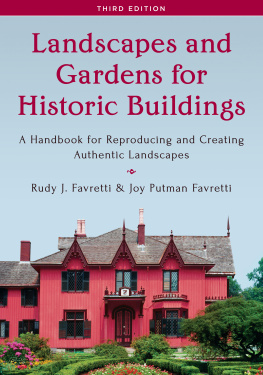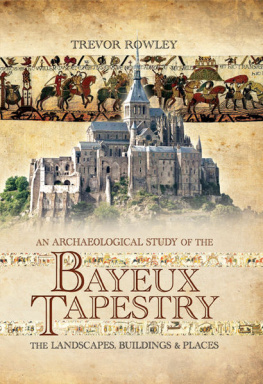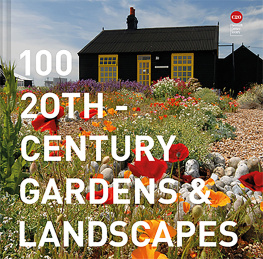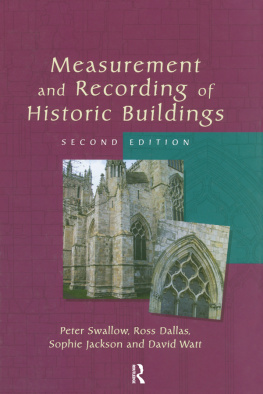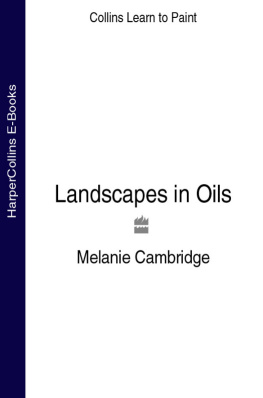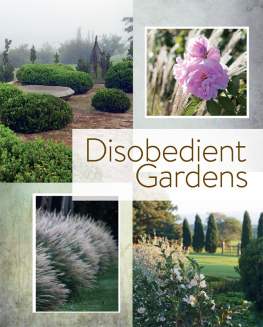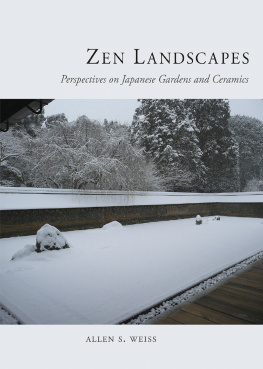Rudy J. Favretti - Landscapes and Gardens for Historic Buildings
Here you can read online Rudy J. Favretti - Landscapes and Gardens for Historic Buildings full text of the book (entire story) in english for free. Download pdf and epub, get meaning, cover and reviews about this ebook. year: 2017, publisher: Rowman & Littlefield Publishers, genre: Religion. Description of the work, (preface) as well as reviews are available. Best literature library LitArk.com created for fans of good reading and offers a wide selection of genres:
Romance novel
Science fiction
Adventure
Detective
Science
History
Home and family
Prose
Art
Politics
Computer
Non-fiction
Religion
Business
Children
Humor
Choose a favorite category and find really read worthwhile books. Enjoy immersion in the world of imagination, feel the emotions of the characters or learn something new for yourself, make an fascinating discovery.
- Book:Landscapes and Gardens for Historic Buildings
- Author:
- Publisher:Rowman & Littlefield Publishers
- Genre:
- Year:2017
- Rating:3 / 5
- Favourites:Add to favourites
- Your mark:
- 60
- 1
- 2
- 3
- 4
- 5
Landscapes and Gardens for Historic Buildings: summary, description and annotation
We offer to read an annotation, description, summary or preface (depends on what the author of the book "Landscapes and Gardens for Historic Buildings" wrote himself). If you haven't found the necessary information about the book — write in the comments, we will try to find it.
Landscapes and Gardens for Historic Buildings — read online for free the complete book (whole text) full work
Below is the text of the book, divided by pages. System saving the place of the last page read, allows you to conveniently read the book "Landscapes and Gardens for Historic Buildings" online for free, without having to search again every time where you left off. Put a bookmark, and you can go to the page where you finished reading at any time.
Font size:
Interval:
Bookmark:
Landscapes and Gardens for Historic Buildings
AMERICAN ASSOCIATION FOR STATE AND LOCAL HISTORY BOOK SERIES
Series Editor
Rebecca K. Shrum, Indiana UniversityPurdue University Indianapolis
MANAGING EDITOR
Bob Beatty, AASLH
EDITORIAL BOARD
Anne W. Ackerson, Leading by Design
William Bomar, University of Alabama Museums
Jessica Dorman, The Historic New Orleans Collection
W. Eric Emerson, South Carolina Department of Archives and History
Tim Grove, National Air and Space Museum
Laura Koloski, Pew Center for Arts & Heritage
Russell Lewis, Chicago History Museum
Jane Lindsey, Juneau-Douglas City Museum
Ann E. McCleary, University of West Georgia
Laurie Ossman, Preservation Society of Newport County
Sarah Pharaon, International Coalition of Sites of Conscience
Laura Roberts, Roberts Consulting
Julia Rose, Homewood Museum at Johns Hopkins University
Sandra Smith, Heinz History Center
Kimberly Springle, Charles Sumner School Museum and Archives
William S. Walker, Cooperstown Graduate Program, SUNY Oneonta
ABOUT THE SERIES
The American Association for State and Local History Book Series addresses issues critical to the field of state and local history through interpretive, intellectual, scholarly, and educational texts. To submit a proposal or manuscript to the series, please request proposal guidelines from AASLH headquarters: AASLH Editorial Board, 2021 21st Ave. South, Suite 320, Nashville, Tennessee 37212. Telephone: (615) 320-3203. Website: www.aaslh.org.
About the Organization
The American Association for State and Local History (AASLH) is a national history membership association headquartered in Nashville, Tennessee. AASLH provides leadership and support for its members who preserve and interpret state and local history in order to make the past more meaningful to all Americans. AASLH members are leaders in preserving, researching, and interpreting traces of the American past to connect the people, thoughts, and events of yesterday with the creative memories and abiding concerns of people, communities, and our nation today. In addition to sponsorship of this book series, AASLH publishes History News magazine, a newsletter, technical leaflets and reports, and other materials; confers prizes and awards in recognition of outstanding achievement in the field; supports a broad education program and other activities designed to help members work more effectively; and advocates on behalf of the discipline of history. To join AASLH, go to www.aaslh.org or contact Membership Services, AASLH, 2021 21st Ave. South, Suite 320, Nashville, TN 37212.
Landscapes and Gardens for Historic Buildings
A Handbook for Reproducing and Creating Authentic Landscapes
Third Edition
Rudy J. Favretti and Joy Putman Favretti
Rowman & Littlefield
Lanham Boulder New York London
Published by Rowman & Littlefield
A wholly owned subsidiary of The Rowman & Littlefield Publishing Group, Inc.
4501 Forbes Boulevard, Suite 200, Lanham, Maryland 20706
www.rowman.com
Unit A, Whitacre Mews, 26-34 Stannary Street, London SE11 4AB
Copyright 2017 by Rowman & Littlefield
All rights reserved . No part of this book may be reproduced in any form or by any electronic or mechanical means, including information storage and retrieval systems, without written permission from the publisher, except by a reviewer who may quote passages in a review.
British Library Cataloguing in Publication Information Available
Library of Congress Cataloging-in-Publication Data
Names: Favretti, Rudy J., author. | Favretti, Joy P., author.
Title: Landscapes and gardens for historic buildings : a handbook for reproducing and creating authentic landscapes / Rudy J. Favretti and Joy Putman Favretti.
Other titles: American Association for State and Local History book series.
Description: Third edition. | Lanham, Maryland : Rowman & Littlefield, [2017] | Series: American Association for State and Local History book series |
Includes bibliographical references and index.
Identifiers: LCCN 2016051644 (print) | LCCN 2016053934 (ebook) | ISBN 9781442260764 (cloth : alk. paper) | ISBN 9781442260771 (pbk. : alk. paper) | ISBN 9781442260788 (Electronic)
Subjects: LCSH: Historic gardensConservation and restorationUnited States. | Historic sitesConservation and restorationUnited States. | Gardens, AmericanConservation and restoration. | Landscape architectureUnited StatesHistory. | Landscape gardeningUnited
States. | Plants, OrnamentalUnited States.
Classification: LCC SB466.U6 F34 2017 (print) | LCC SB466.U6 (ebook) | DDC 712/.60973dc23
LC record available at https://lccn.loc.gov/2016051644
 The paper used in this publication meets the minimum requirements of American National Standard for Information SciencesPermanence of Paper for Printed Library Materials, ANSI/NISO Z39.48-1992.
The paper used in this publication meets the minimum requirements of American National Standard for Information SciencesPermanence of Paper for Printed Library Materials, ANSI/NISO Z39.48-1992.
Printed in the United States of America

Preface
The words preservation and restoration have been part of our vocabulary since childhood. Joy lived in a carefully reproduced period house in her early years and then, as a teenager, in a historic house built in 1696 that her family restored. Rudys fathera master carpenter who learned his trade with hand tools and by apprenticing for five years in his native Dolomites of northern Italy, before emigrating to Americaspent most of his professional career restoring old and historic houses, several of them in the historic village at Mystic Seaport in Mystic, Connecticut. We thought that everyone knew about preservation-restoration until we became involved ourselves, but as Rudys father often said: People spend tons of money restoring the house, and then they go down to the store and buy junky stuff to plant around it.
We both decided to specialize in preservation-restoration within our chosen fields of landscape architecture and botany. Little had been written about restoring the grounds around historic buildings except for a few accounts about Williamsburg. There was nothing of a how-to nature, or a book offering guidance. This is why we decided to write the first edition of this book in 1978, after we had practiced as professionals in the field for twenty years. Now, after almost sixty years of practice, it is time for another revision of what many refer to as the bible of landscape restoration.
We have kept the organization of the book basically the same, with the first and lengthy chapter describing American landscape design from the seventeenth century to the twentieth century. Chapter 2 deals with research toward plan development, and it suggests various possible sources for determining what the landscape for a particular site should be, or might have been, followed by instructions on how to develop the plan for that landscape. Joys chapter 3 has extensive lists of plants for particular periods and styles of landscapes. Each plant listed can be documented from lists that were printed in-period. The documentation is not included in the book lest it becomes encyclopedic and cumbersome to use as a handbook. However, that documentation is available if needed. Chapter 4 discusses maintenance issues from lawns to soil fertility to dealing with the wear and tear of pedestrian circulation, as well as many other issues, such as developing a maintenance plan.
Within this basic framework that has worked well for the past thirty-eight years, we have made approximately 150 revisions, about a third of them major. We have eliminated sources of heirloom plants because there is now a plethora of seed houses and nurseries dealing with them. Therefore, any list would inadvertently be incomplete and unfair to those not included. Today it is easy to Google the name of any heirloom plant, using its botanical name followed by the word source, and the results spring forth.
Next pageFont size:
Interval:
Bookmark:
Similar books «Landscapes and Gardens for Historic Buildings»
Look at similar books to Landscapes and Gardens for Historic Buildings. We have selected literature similar in name and meaning in the hope of providing readers with more options to find new, interesting, not yet read works.
Discussion, reviews of the book Landscapes and Gardens for Historic Buildings and just readers' own opinions. Leave your comments, write what you think about the work, its meaning or the main characters. Specify what exactly you liked and what you didn't like, and why you think so.

